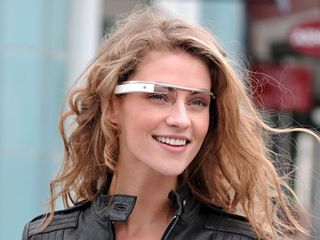Schmidt: Talking To Google Glass Can Be a Little Weird

From an observer's point of view, talking to Google Glass probably looks a lot like talking on a Bluetooth ear piece: extremely weird. You know who those people are: they walk around looking like they're talking to invisible friends or their other personality, but in reality it's a phone call piped in through the connecting Bluetooth gadget. Google Glass, it seems, would be a little less transparent.
Still, despite the appearance, talking to a gadget isn't quite the norm, especially when there's nothing in your hands. Google Executive Chairman Eric Schmidt, who just recently confirmed that the retail version will not arrive until around 2Q14, admitted that controlling the headset through voice recognition is the "weirdest thing".
During a talk on Thursday at Harvard University's Kennedy School of Government, Schmidt told attendees that people will need to develop a "new etiquette" to deal with products that can not only bring up information that only the wearer can see, but record video undetected. "There are obviously places where Google Glasses are inappropriate," he said.
Google recently began shipping Glass to developers and contributors of its Explorer program. Originally the specs were slated for a 4Q13 release, but recent talk of "etiquette" and the confirmed delay seems to indicate that Google wants to tread this new wearable tech territory with upmost caution, and not fall prey to similar privacy issues it faced with Street View.
The company is also planning to take a different approach to apps for the upcoming specs, requiring that all apps be pre-approved before they're offered to Glass users. For Android tablets and smartphones, Google typically scans apps after they have already landed on Google Play, a method some critics blame for the number of malware-laced apps creeping into Google's storefront.
"It's so new, we decided to be more cautious," Schmidt said, confirming speculations behind the Glass delay. "It's always easier to open it up more in the future."
Back in March, the owner of a Seattle-based bar said that he will not allow Glass to enter his establishment. As it stands now, the bar already doesn't allow people to film or take pictures under its roof. They're unwanted, he said, and that the bar is a private place that people visit.
Stay on the Cutting Edge
Join the experts who read Tom's Hardware for the inside track on enthusiast PC tech news — and have for over 25 years. We'll send breaking news and in-depth reviews of CPUs, GPUs, AI, maker hardware and more straight to your inbox.
"It’s OK if you wear them, I just don’t want them worn inside," he added.
Also in March, a website went live that lists all the establishments that bans Google Glass. Called NoGlass!, it's a free and open-source list that allows customers and businesses to submit locations where the wearable tech is not allowed. Visitors simply enter their location in the search field to pull up a list of Glass-free restaurants, stores and whatnot.
-
everlast66 I would be more inclined to believe that people that sank a grand into this gadget are talking to themselves!Reply -
senkasaw If this were the Star Trek universe it wouldn't be weird. We definitely need more voice activated stuff. I'm really looking forward to the day when I am having issues finding the right screw at the hardware store (you know what I am talking about...you find the ones just bigger and just smaller than the one you are looking for, the dang thing is never where it should logically be located) I can address the "computer" and ask it to locate the screw I need, and then have an attractive yet helpful voice respond with the appropriate information.Reply
That would be nice. -
Talking to your smartphone can be a bit weird too. The fact of the matter is that a device like this WILL add value to your life. How much value? No one knows. It has to be enough to outweigh privacy concerns. Google is going to need a strong developer environment and some keen marketing to pull this off. I haven't even found many startups in my travels that are focusing on wearable computing like the Glass platform. I've only found http://www.dsky9.com -- They have a free GlassFAQ with PSD templates for rapid prototyping Glass apps, UI/UX info, market analysis.. the whole shabazzi. I figured that I would pass it along because it was a great resource for me as a developer. Does anyone else have any insights on where this market will go? Will Glass be the be-all-end-all wearable form factor?Reply
-
killerclick I'm just interested in wearable displays. Instead of having a smartphone, and a tablet, and a 13" laptop and a multi-monitor desktop, I wish I could only make-do with a smartphone and glasses or whatever that turn my entire field of vision into a display. Integrate motion sensing into it, maybe even subvocalization recognition, and we'll finally have one form factor to rule them all.Reply
-
strained_brain I somehow feel that porn will be a driving factor in this technology, as it is for most new technologies. :-)Reply
Most Popular




